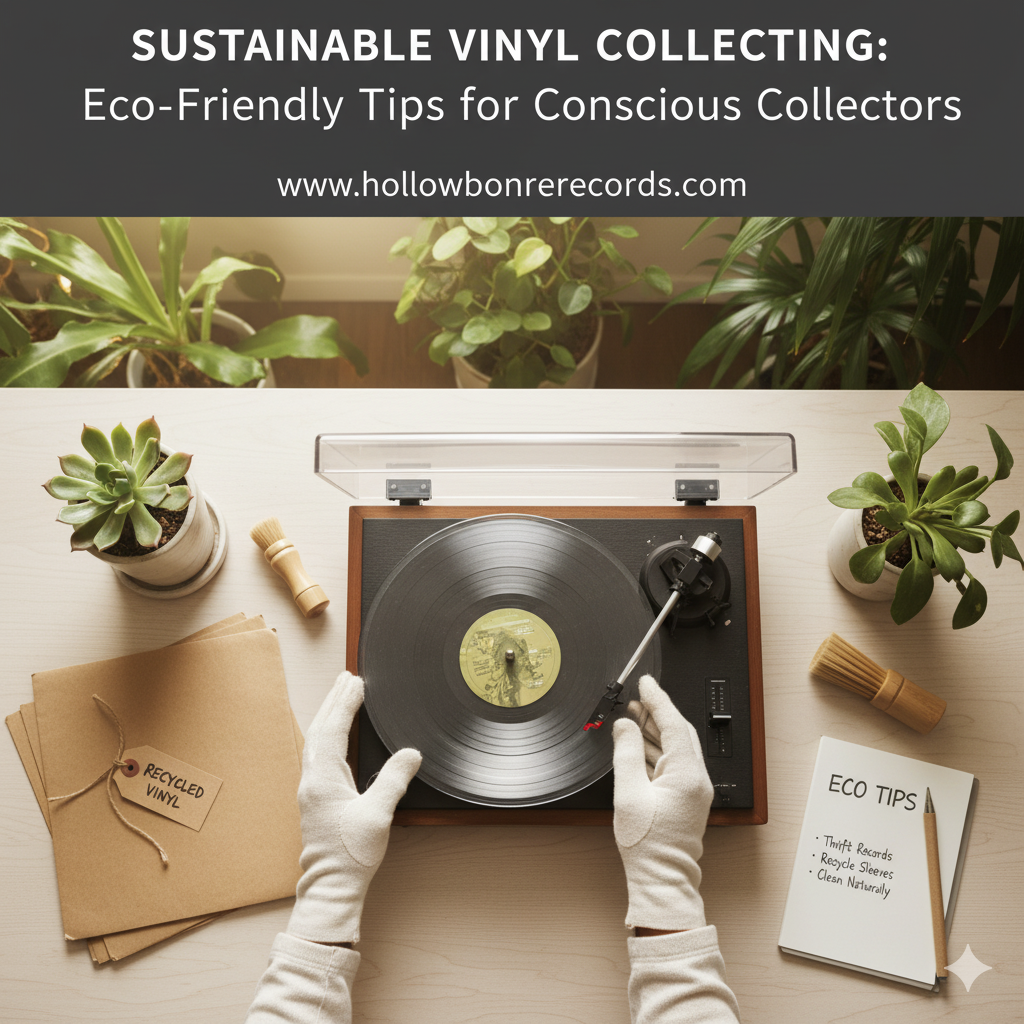Sustainable Vinyl Collecting: Eco-Friendly Tips for Conscious Collectors
Vinyl records have experienced a resurgence in recent years, captivating both seasoned audiophiles and new enthusiasts. However, as the popularity of vinyl grows, so does its environmental impact.
Traditional vinyl records are made from polyvinyl chloride (PVC), a plastic that poses challenges in terms of recyclability and environmental sustainability.
In this article, we'll explore practical and eco-friendly tips to help you enjoy your vinyl collection while minimizing your ecological footprint.
1. Opt for Eco-Friendly Vinyl Pressings
When adding to your collection, consider choosing records made from sustainable materials. Some pressing plants are now producing vinyl using recycled materials or alternative substances like PET (polyethylene terephthalate), which is more recyclable than PVC Movacolor. Artists like Billie Eilish have also advocated for environmentally conscious pressing methods, encouraging the industry to adopt greener practices Imagine5.
2. Support Labels Committed to Sustainability
Research and support record labels that prioritize sustainability in their production processes. Labels that use eco-friendly materials, energy-efficient equipment, and sustainable packaging contribute positively to the environment. By purchasing from these labels, you encourage the industry to adopt more sustainable practices.
3. Care for Your Records to Extend Their Lifespan
Proper maintenance of your vinyl records can significantly reduce the need for replacements. Regularly clean your records with appropriate tools, such as carbon fiber brushes, and store them in a cool, dry place away from direct sunlight. Using high-quality inner sleeves can also protect your records from dust and scratches, ensuring they last longer.
4. Recycle or Repurpose Old Records
Instead of discarding damaged or unwanted records, consider recycling or repurposing them. Some companies specialize in recycling vinyl records into new products, such as eco-friendly packaging or even new vinyl pressings. Alternatively, you can get creative and turn old records into art pieces, coasters, or wall clocks, giving them a second life and reducing waste.
5. Choose Sustainable Packaging Options
When purchasing vinyl records, opt for those that come in sustainable packaging. Look for biodegradable sleeves, recycled paper inserts, and minimal plastic use. Additionally, when shipping records, choose eco-friendly packaging materials like recycled cardboard and paper mailers to reduce environmental impact.
6. Support Local Record Stores
Buying from local record stores not only supports small businesses but also reduces the carbon footprint associated with shipping products over long distances. Many local shops are also more likely to carry eco-friendly products and can offer personalized recommendations based on your sustainability preferences.
7. Educate Yourself and Others
Stay informed about the environmental impact of vinyl records and share this knowledge with fellow collectors. By raising awareness, you can encourage more people to make sustainable choices in their collecting habits, leading to a collective positive impact on the environment.
Quick Takeaways
-
Opt for vinyl records made from recycled materials or alternative plastics like PET.
-
Support record labels and artists committed to sustainable practices.
-
Properly care for your records to extend their lifespan and reduce waste.
-
Recycle or repurpose old records instead of discarding them.
-
Choose sustainable packaging options when purchasing or shipping records.
-
Support local record stores to reduce shipping-related carbon emissions.
-
Educate yourself and others about the environmental impact of vinyl collecting.
Conclusion
Sustainable vinyl collecting is about making informed choices that align with environmental consciousness. By opting for eco-friendly pressings, supporting responsible labels, and caring for your collection, you can enjoy the rich sound of vinyl while minimizing your ecological footprint. Remember, every small action contributes to a larger positive impact on our planet.
For those interested in expanding their collection with sustainable options, explore our curated selection of eco-friendly vinyl records at Hollow Bone Records.
FAQs
1. Are all vinyl records made from PVC?
Most traditional vinyl records are made from PVC, but some pressing plants are now using alternative materials like recycled PET to reduce environmental impact.
2. How can I tell if a vinyl record is eco-friendly?
Look for labels or information on the packaging indicating the use of recycled materials, biodegradable packaging, or sustainable production practices.
3. Can I recycle old vinyl records?
Recycling options for vinyl records are limited due to the materials used. However, some companies specialize in recycling vinyl into new products. Alternatively, consider repurposing old records creatively.
4. Does buying vinyl records contribute to plastic waste?
Yes, traditional vinyl records contribute to plastic waste. However, by choosing eco-friendly options and supporting sustainable practices, you can mitigate this impact.
5. How can I support sustainable practices in the vinyl industry?
Support record labels and artists committed to sustainability, choose eco-friendly products, and raise awareness about the environmental impact of vinyl collecting.
We'd Love to Hear from You!
Have you adopted any sustainable practices in your vinyl collecting? Share your experiences and tips with us in the comments below. Don't forget to share this article with fellow collectors to spread the word about eco-friendly vinyl collecting!
References



